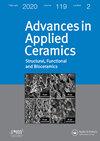Effect of screw access hole on the fracture load of implant-supported monolithic zirconia single crown
IF 1.6
4区 材料科学
Q3 MATERIALS SCIENCE, CERAMICS
引用次数: 0
Abstract
ABSTRACT Implant-supported cement–screw-retained crowns combine the advantages of screw-retained and cement-retained crowns. However, the occlusal screw access hole interrupts porcelain integrity, which may result in porcelain cracks or fractures. There is insufficient scientific evidence to prove that screw access holes affect the fracture load of implant-supported monolithic zirconia crowns. In this study, we investigated the effects of the screw access hole and its preparation technique on the fracture load of implant-supported monolithic zirconia single crown. The crowns were designed for the maxillary right first premolar. Three techniques analysed for screw access hole preparations included computer-aided designed/computer-aided manufactured (CAD/CAM) before sintering, manually prepared after sintering, and then resintering. Our findings show that the screw access holes and preparation techniques have no significant effects on the fracture load of implant-supported monolithic zirconia single crown. On the other hand, the screw access hole preparation techniques affect failure initiation in implant-supported monolithic zirconia single crown.螺钉接入孔对种植支撑氧化锆单冠断裂载荷的影响
种植体支撑骨水泥-螺钉固位冠结合了螺钉固位冠和骨水泥固位冠的优点。然而,咬合螺钉进入孔破坏了瓷体的完整性,可能导致瓷体裂纹或断裂。目前尚没有足够的科学证据证明螺钉接入孔对种植单片氧化锆冠断裂载荷的影响。在本研究中,我们研究了螺钉接入孔及其制备技术对种植体支撑氧化锆单冠断裂载荷的影响。冠是为上颌右第一前磨牙设计的。分析了螺杆接头孔制备的三种工艺:烧结前计算机辅助设计/计算机辅助制造(CAD/CAM)、烧结后人工制备、再烧结。结果表明,螺钉接入孔和制备工艺对单冠氧化锆种植体的断裂载荷无显著影响。另一方面,螺钉通路孔制备技术对种植体支撑氧化锆单冠的失效起裂有影响。
本文章由计算机程序翻译,如有差异,请以英文原文为准。
求助全文
约1分钟内获得全文
求助全文
来源期刊

Advances in Applied Ceramics
工程技术-材料科学:硅酸盐
CiteScore
4.40
自引率
4.50%
发文量
17
审稿时长
5.2 months
期刊介绍:
Advances in Applied Ceramics: Structural, Functional and Bioceramics provides international coverage of high-quality research on functional ceramics, engineering ceramics and bioceramics.
 求助内容:
求助内容: 应助结果提醒方式:
应助结果提醒方式:


